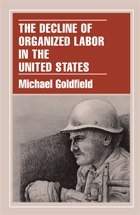
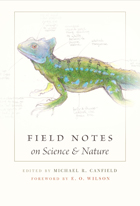
Once in a great while, as the New York Times noted recently, a naturalist writes a book that changes the way people look at the living world. John James Audubon’s Birds of America, published in 1838, was one. Roger Tory Peterson’s 1934 Field Guide to the Birds was another. How does such insight into nature develop?
Pioneering a new niche in the study of plants and animals in their native habitat, Field Notes on Science and Nature allows readers to peer over the shoulders and into the notebooks of a dozen eminent field workers, to study firsthand their observational methods, materials, and fleeting impressions.
What did George Schaller note when studying the lions of the Serengeti? What lists did Kenn Kaufman keep during his 1973 “big year”? How does Piotr Naskrecki use relational databases and electronic field notes? In what way is Bernd Heinrich’s approach “truly Thoreauvian,” in E. O. Wilson’s view? Recording observations in the field is an indispensable scientific skill, but researchers are not generally willing to share their personal records with others. Here, for the first time, are reproductions of actual pages from notebooks. And in essays abounding with fascinating anecdotes, the authors reflect on the contexts in which the notes were taken.
Covering disciplines as diverse as ornithology, entomology, ecology, paleontology, anthropology, botany, and animal behavior, Field Notes offers specific examples that professional naturalists can emulate to fine-tune their own field methods, along with practical advice that amateur naturalists and students can use to document their adventures.

Precious oil and export markets, wars in Lebanon and the Persian Gulf, peace talks at the White House, terrorist eruptions: more now than ever, Arab affairs are the West's affair. And yet as we find ourselves increasingly enmeshed in its politics and economics, the Middle East remains a mystery to most of us, a world of dimly understood connections and impenetrable complexities. The Arab world at last becomes accessible in this book. The only study to include developments since the Gulf War and the historic pact between Israel and the PLO, Inside the Arab World gives us a complete and detailed picture of the region as it is today, as well as a clear sense of how Arab affairs have evolved and where they may lead.
Despite its abundance of oil, the Arab world has failed to produce a single successful economy. Michael Field, a recognized expert and longtime reporter on the Arab states, ably explores the cultural, political, and geographic reasons for this failure. Ranging from Algeria to the Gulf states to Egypt and Syria, he considers the fragmentation of society, the people's tolerance of bad government, corruption, and the deadening economic effect of Arab socialism. But he also shows how the region--influenced partly by exposure to Western media, partly by reforms imposed by creditors--is changing now, taking its first cautious steps toward democracy, whose opportunities so far have been most firmly grasped by Islamic fundamentalists.
Timely, thorough, and highly readable, this book offers much-needed insight into the Arab world as its politics and policies increasingly engage our own.
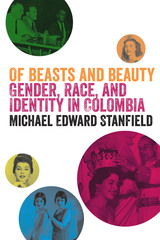
All societies around the world and through time value beauty highly. Tracing the evolutions of the Colombian standards of beauty since 1845, Michael Edward Stanfield explores their significance to and symbiotic relationship with violence and inequality in the country. Arguing that beauty holds not only social power but also economic and political power, he positions it as a pacific and inclusive influence in a country “ripped apart by violence, private armies, seizures of land, and abuse of governmental authority, one hoping that female beauty could save it from the ravages of the male beast.” One specific means of obscuring those harsh realities is the beauty pageant, of which Colombia has over 300 per year. Stanfield investigates the ways in which these pageants reveal the effects of European modernity and notions of ethnicity on Colombian women, and how beauty for Colombians has become an external representation of order and morality that can counter the pathological effects of violence, inequality, and exclusion in their country.
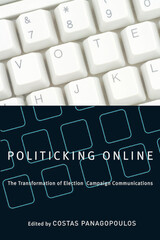
While the Internet may have transformed the landscape of modern political campaigns throughout the world, Costas Panagopoulos reminds readers that officials and campaign workers need to adapt to changing circumstances, know the limits of their methods, and combine new technologies with more traditional techniques to achieve an overall balance.
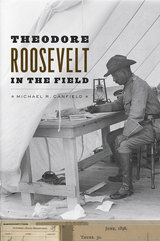
Drawing extensively on Roosevelt’s field notebooks, diaries, and letters, Canfield takes readers into the field on adventures alongside him. From Roosevelt’s early childhood observations of ants to his notes on ornithology as a teenager, Canfield shows how Roosevelt’s quest for knowledge coincided with his interest in the outdoors. We later travel to the Badlands, after the deaths of Roosevelt’s wife and mother, to understand his embrace of the rugged freedom of the ranch lifestyle and the Western wilderness. Finally, Canfield takes us to Africa and South America as we consider Roosevelt’s travels and writings after his presidency. Throughout, we see how the seemingly contradictory aspects of Roosevelt’s biography as a hunter and a naturalist are actually complementary traits of a man eager to directly understand and experience the environment around him.
As our connection to the natural world seems to be more tenuous, Theodore Roosevelt in the Field offers the chance to reinvigorate our enjoyment of nature alongside one of history’s most bold and restlessly curious figures.

READERS
Browse our collection.
PUBLISHERS
See BiblioVault's publisher services.
STUDENT SERVICES
Files for college accessibility offices.
UChicago Accessibility Resources
home | accessibility | search | about | contact us
BiblioVault ® 2001 - 2024
The University of Chicago Press









